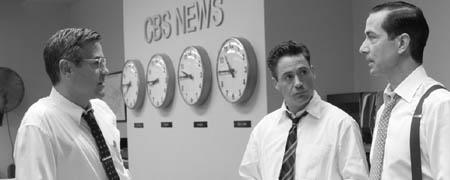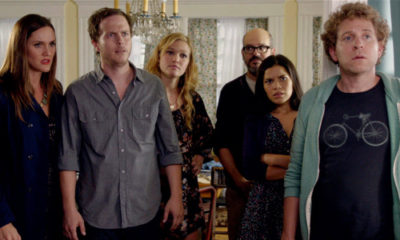Retro IONCINEMA.com
Good night. and, good Luck.
[George Clooney, David Strathaim and Patricia Clarkson recently held a press conference in New York City and Marcello Paolillo was there to cover it.]
In 1953, America fought a battle for its own freedom: a war fought within its own borders since, as it happens (though we easily forget), real freedom starts at home, even though, somehow, it seems easier to impose abroad. TV was in its dawning age, and Edward R. Murrow – destined to become one of the most famous American journalists – had an undeniable privilege as an anchorman for CBS, which meant delivering the nightly news to an audience of 40 million people. Murrow used this advantage for a good cause, and started a dangerous fight against notorious Senator Joseph McCarthy, at his peak in the Communist witch hunt that was terrorizing the nation.
Risking his own career, and backed by his courageous producer Fred Friendly, Murrow dedicated one of the shows of his program “See It Now” to the story of a pilot, Milo Radulovich, who lost his job for being considered a security risk because he simply refused to denounce his father and sister who were suspected of communist sympathies. Unshaken by the external pressures that started falling on CBS, Murrow decided to directly target the persona of Senator McCarthy. A second show, in fact, strictly focused on McCarthy’s methods during the witch-hunts trials, and Murrow let the original footage of the hearings speak for itself, in order to not be accused of falsifying sources. The program was the beginning of a vicious battle (McCarthy openly addressed Murrow on TV as a Communist), but in the end, managed to undermine the credibility of the Senator and, as a long term effect, proved to have a key role in his downfall.

Engraved by a tough, eloquent speech on the role and duties of TV that Murrow gave at the Radio and Television News Directors Association in 1958, Good Night, and Good Luck represents a great accomplishment for director George Clooney, revealing his firm hand and clear vision in handling the subject, and addressing serious issues about democracy and individual freedom that strongly resonate nowadays.
As Patricia Clarkson [who plays Shirley Wershba, the only woman in the whole movie] declared during the press conference in New York: “I think this film is extremely relevant to nowadays society. The themes of this movie – like the issues concerning civil rights and civil liberties – of course continue on in our government and political system. I think it’s important to present the past so that we remember it, and don’t repeat the same mistakes.” And David Straithairn [who plays Murrow in the film] maliciously hints that it’s no coincidence that the film is released in the days of the Patriot Act.
But at the same time, Good Night, and Good Luck appears as a brilliant counterpoint to Clooney’s first feature. In both Confessions of a Dangerous Mind and Good Night, and Good Luck, Clooney’s main target is the responsibility of TV in American society, even though it’s addressed from opposite angles. Confessions of a Dangerous Mind was a film about a TV gameshow host (Chuck Barris) who turned real life into a TV show and ended up losing himself in a (con)fusion between truth and fiction. Good Night, and Good Luck is a film about a TV news anchorman (Edward Murrow) who fought all of his life for the absolute truth over fiction and primarily for the importance of reality against entertainment. “In a way, you could say that I touched the lowest and highest points in television”, joked Clooney during the press conference.

The style of the two films couldn’t be more different, but in both cases appears completely coherent with the stories told and the characters portrayed. Confessions of a Dangerous Mind was, as Chuck Barris, a big entertainment: pop and colorful, full of camera movements, clever transitions, powerful score and endless twists. Good Night, and Good Luck, as Edward Murrow, is instead very rigorous and concise, almost ascetic in its restrictions. In Confessions, we follow Barris all over the world, in his rocky relationships, and throughout his tumultuous career. In Good Night, we stay all the time in a TV studio, on Murrow face, on the real historical footage. We never get a glimpse of his private life, and we only see Murrow in a particular period of his career (1953-54, a part from the speech he gave in 1958 that opens and closes the film).
In other words, it’s as if, in his first feature, Clooney seemed eager to please and impress by proving his skills in every shot, while here he found out that less is more, and courageously chose to stick to the basics and get rid of anything that could bring him away from the main focus. No color, but a beautifully crisp, highly contrasted black and white. No background score, only few songs recorded live by Dianne Reeves as intermissions between chapters. No other distraction: only the search for the truth. In particular, the choice of black and white proves to be extremely successful, since it makes the transitions between the film and the real footage so smooth that, as Clooney revealed in the press conference, “there were people after the screening who asked me who was the actor playing McCarthy, while it’s the real Senator in the original footage. ”
What’s equally amazing in both films, are the lead characters’ portrayals. In both cases, Clooney has chosen for the main role two actors “under the radar” who were forced to impersonate two extremely popular TV icons and, in doing so, delivered a stunning, incredible performance (as a result, both thespians won as best actor: Sam Rockwell at the Berlin Film Festival, and David Strathairn at the Venice Film Festival).
But the different approach brings, of course, different results. In spite of its commercial lack of success, Confessions of a Dangerous Mind, blessed by a tricky script from Charlie Kaufman, is a smart and intriguing remark on the risks of deception. Good Night, and Good Luck faces instead the risks of integrity, and in spite of its historical setting, has an undeniable modern day political impact. The film addresses, in fact, a crucial issue: how dangerous a democracy can be if fear is used as a weapon. As Murrow says in his controversial show against Senator McCarthy: “We proclaim ourselves, as indeed we are, the defenders of freedom, whenever it continues to exist in the world, but we cannot defend freedom abroad by deserting it at home.” It’s difficult not to perceive it, to a certain extent, as a film about America post-9/11.

As Clooney declared: “It’s not an overtly political film, but it’s a film by someone who happens to be political. It’s a historical piece, but if it opens up a debate, that’s good. If some kid in Cincinnati sees the film and decides to be a journalist or a writer because of it, then we win. We aren’t used to political issues in films anymore, but it’s like protest songs in the Sixties: it takes a while for everybody to catch up and then it catches up. There are periods of time in which we don’t care much for political or social issues and then, when these issues become the forefront, it takes a while before seeing them on screen. Guess who’s coming to Dinner was an amazing film if you think it came out in the middle of the Civil Rights movement, Best Years of our Lives was a beautiful film about coming out of the war, The Young Lions was an incredible remark on the Second World War, and so on… there are plenty of movies who managed to raise important questions over the years. I’ve got another one coming up called Syriana [a violent pamphlet about the responsibilities of US in the Middle East, directed by Traffic writer Stephen Gaghan] that is gonna stir up lots of controversy… Yet, on the other hand, I’ve nothing against pure entertainment. Also Murrow had to do the program Person to Person for commercial reasons. In the end, if my sell-out is Ocean’s Eleven, I’m doing ok. If it’s Batman and Robin, than I am in trouble…”.
Warner Independent Pictures’ Good night. and, good luck. gets released in New York and Los Angeles on October 8th, followed by a wider release.
For more information visit the official site.



























